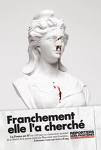
No, we're not dead!
Feminism has always been so critizised that it is not good today to call yourself a feminist. Introduced as dangers for the moral order, some think that feminists stir up the war between sexes.
Men say: “Why the hell do they go on fighting because they have all the rights they asked for?” Abortion rights, contraception, parity in politics... A very hypocritical argument, indeed, because these rights benefit also men. Aren’t you happy, gentlemen, not to be fathers at 16 years-old?
In France, the movement for parity in politics and public life began in the 90’s. These inequalities were relieved by newspaper journalists, especially young ones. Feminism has always had a good capacity of mobilization. In November 1995, 100 000 people marched for contraception and abortion, threatened by the government. This new-feminism is not like the 68’s movement. If it is less militant, it continues to be alert. It also includes men now, to the contrary of the MLF, which was essentially non-mixed.
We of course are luckier than our grandmothers, thanks to them. But feminist associations, like “Chiennes de garde”, are still very useful and have some duties:
- A duty of alertness : they have to make sure that our rights are still growing, and not disappearing.
- A duty of education
- A duty of action against the still existing inequalities : and there are many (differences of wages, sexist jokes, lack of representation in politics...).
- A duty of international solidarity : feminists have to fight for women’s rights all over the world (against rape, forced marriage, for civil rights...) and for the end of patriarchy.
- A duty of memory : the fight of our grandmothers must be known by everyone (not only women).
Men say: “Why the hell do they go on fighting because they have all the rights they asked for?” Abortion rights, contraception, parity in politics... A very hypocritical argument, indeed, because these rights benefit also men. Aren’t you happy, gentlemen, not to be fathers at 16 years-old?
In France, the movement for parity in politics and public life began in the 90’s. These inequalities were relieved by newspaper journalists, especially young ones. Feminism has always had a good capacity of mobilization. In November 1995, 100 000 people marched for contraception and abortion, threatened by the government. This new-feminism is not like the 68’s movement. If it is less militant, it continues to be alert. It also includes men now, to the contrary of the MLF, which was essentially non-mixed.
We of course are luckier than our grandmothers, thanks to them. But feminist associations, like “Chiennes de garde”, are still very useful and have some duties:
- A duty of alertness : they have to make sure that our rights are still growing, and not disappearing.
- A duty of education
- A duty of action against the still existing inequalities : and there are many (differences of wages, sexist jokes, lack of representation in politics...).
- A duty of international solidarity : feminists have to fight for women’s rights all over the world (against rape, forced marriage, for civil rights...) and for the end of patriarchy.
- A duty of memory : the fight of our grandmothers must be known by everyone (not only women).





